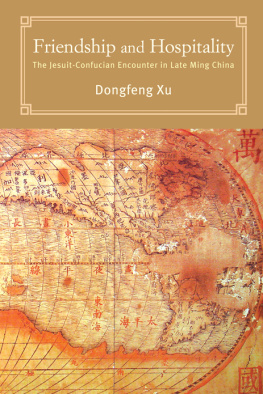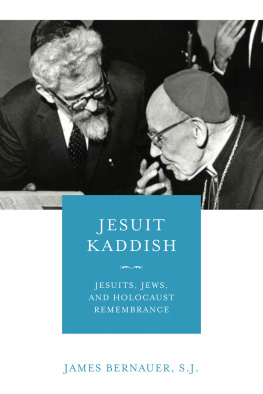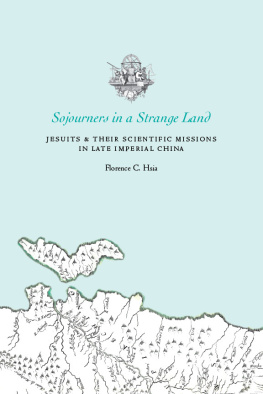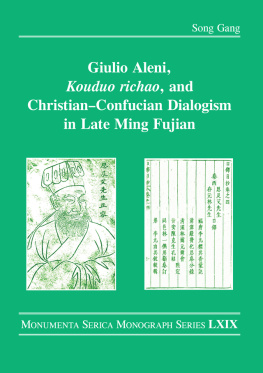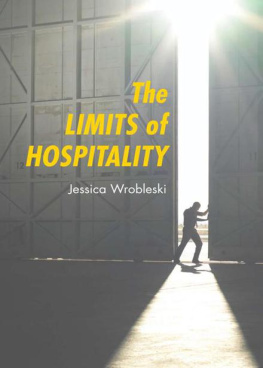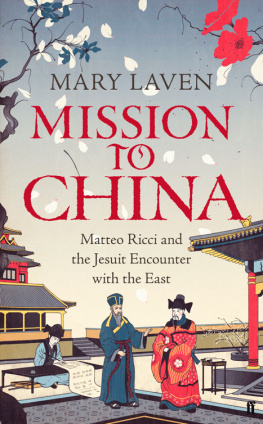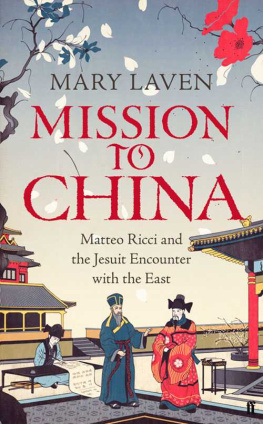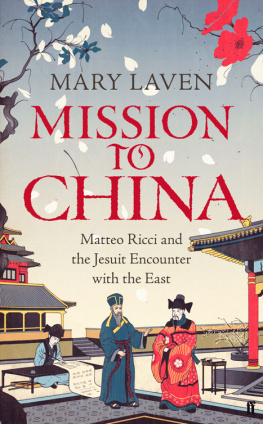Cover image: Chinese world map, drawn by the Jesuits, early seventeenth century. Reproduction in Historic Maritime Maps by Donald Wigal. Author unknown.
Published by State University of New York Press, Albany
2021 State University of New York
All rights reserved
Printed in the United States of America
No part of this book may be used or reproduced in any manner whatsoever without written permission. No part of this book may be stored in a retrieval system or transmitted in any form or by any means including electronic, electrostatic, magnetic tape, mechanical, photocopying, recording, or otherwise without the prior permission in writing of the publisher.
For information, contact State University of New York Press, Albany, NY
www.sunypress.edu
Library of Congress Cataloging-in-Publication Data
Name: Xu, Dongfeng, author
Title: Friendship and hospitality : the Jesuit-Confucian encounter in late Ming China
Description: Albany : State University of New York Press, [2021] | Series: SUNY series in Chinese philosophy and culture| Includes bibliographical references and index.
Identifiers: ISBN 9781438484952 (hardcover : alk. paper) | ISBN 9781438484969 (ebook)
Library of Congress Control Number: 2021939445
Further information is available at the Library of Congress.
10 9 8 7 6 5 4 3 2 1
Acknowledgments
In the course of writing this book I have incurred numerous debts to many teachers, friends, and colleagues, so many that it is impossible for me even to recall, much less mention, them all.
I must first thank my teachers, and first and foremost the late Professor Anthony C. Yu, my mentor and supervisor, under whom it was my good fortune to study and to whom I owe the deepest thanks. Throughout the years, he was always in my corner, providing guidance, encouragement, and support, and from him I learned a great deal about literature, religion, and culture. He greatly contributed to my intellectual and professional growth, and his absence has left a void in my life. I thank Professor Walter Rulph Johnson for teaching me. He is a teacher who is impressive, with his vast knowledge of literature and culture, ancient, modern, and postmodern, and at the same time extremely easygoing, with his good humor and unpretentious personality. Only I know how much appreciation I have for him for his kindness and instruction. My heartfelt thanks go to Professor Franoise Meltzer for her immense kindness to me. Forever supportive, she is always genuinely happy to know whatever little progress I make. Her sharp-mindedness and excellent scholarship have always been inspiring to me. To Professor Joshua Scodel, I owe special thanks for his support and encouragement to me through the years. His help to me continues up to this day. His support and kindness have meant a great deal to me. I wish to mention with deep gratitude these Chicago teachers who taught and helped me: Professors Edward Shaughnessy, Michael Murrin, Marshall Sahlins, Robert von Hallberg, Susan Schreiner, David Tracy, Bernard McGinn, Prasenjit Duara, Judith Zeitlin, Donald Harper, William Schweiker, Peter White, George Zhao. I thank Mr. Cai Fangpei, Dr. Yang Jun, and Dr. Wang Youqin. I must also thank the late Professors David T. Roy, Nancy Helmbold, and Frank Reynolds, who taught and helped me.
At Chicago, I was particularly privileged to have a group of good friends, many of whom are now experienced teachers and accomplished scholars. First, I want to mention these close friends of mine. Li Sher-shiueh has helped me in many ways. Because we both work on the Jesuit mission to China, he has always been generous and helpful in sharing with me his ideas and work. It was with his help that I spent a year working as a postdoctoral fellow at the Institute of Literature and Philosophy, Academia Sinica, in Taiwan. Zhou Yiqun, my fellow student of Professor Yu, is one of the first friends I made at Chicago. The many conversations we have had have been as enjoyable as they have been inspiring to me. A good and true friend, she is always ready to give her support and help. For her unfailing support, thoughtful help, and constant encouragement, to say that I am most grateful to her is somewhat of an understatement. Richard G. Wang, also a student of Professor Yu, has been a true friend from the beginning. He always encourages me and helps me. A dedicated and learned scholar, he never fails to impress me with his broad knowledge and good understanding of Chinese culture, literature, and religion. His friendship has been the source of my strength. Lam Ling Hon and Bao Weihong have been good and inspiring friends who, with their unfailing devotion to scholarship, constantly read, think, and write. The laughter we have shared, the numerous discussions we have had, and the movies we have watched together will always be remembered. It is a pity that we now live with virtually the entire country of America between us. But every communication we have, by phone or email, brings the same immense joy and scholarly stimulation as before. Corinne Bayerl, Ichiro Yuhara, Max Bohnenkamp, and Helen Hi-sun Kim have been great friends through the years.
Good friends from the Chicago years also include Rebecca (Rivi) Handler-Spitz, Hulya Adak, James St. Andr, Catherine Stuer, Paize Keulemans, Eugenia Lean, Nicole Zhange Ni, George Streeter, Rocco Lacorte, Magnus Fiskesj, Chris Lehrich, Kimberley Borchard, Juan Pablo Gil, Li Yuhang, Viren Murthy, Dr. Elias Dakwa, Liu Wei, Wang Shengyu, Paulo Brito, Xu Peng, Yang Lin, Justin Howell, Peng Ke, Wang Yi, Miao Xin, and many others. Their kindness, help, encouragement, and support brought much warmth and joy to me. The ties we formed remain strong and continue to get me support and help.
My thanks also go to Dr. Zhou Yuan, and the late Dr. Tai-loi Ma, present and past curators of Regenstein Librarys East Asian Collections, and the able librarians Qian Xiaowen and the late William Alspaugh, for helping me locate needed books. I am grateful to Michael Berger at the Center for the Studies of Languages for his help and friendship through the years. He has been a good friend. To Theodore N. Foss, former vice director at the Center for East Asian Studies, I owe special thanks. I have learned tremendously from him about the Jesuit mission to late imperial China. The many books he lent to me, and the books he gave me as gifts, which include a set of the invaluable, beautiful, and useful Fonti Ricciane, have been crucial for my work.
After leaving Chicago, I have come to know a number of friends and fellow scholars through jobs and at conferences who have been so kind as to share ideas, provide help, and offer support. They include Ho Wan Li, Raymond Ho, Joan Qiong Le, Zhang Na, Ao Xuegang, Li Hong, Li Yu, Elena Glazov-Corrigan, Cai Rong, Julliette Stapanian-Apkarian in Atlanta, Georgia; Lin Hsi-chiang (Kid), Liao Chin-Ping, Huang Ya-hsien, Chao Tung-ming, and Hsu Yu-lung at Academia Sinica, who, so kind to me during my stay in Taiwan, have been good friends; Professors Hu Siao-chen, Chow Ta-hsing, Lin Yueh-hui, Liao Chao-heng, Yang Chen-te, Yang Chin-lung, Tsai Chang-lin, Chiang Chiu-hua, Chang Ji-lin, Chen Hsiang-yin, Liu Chiung-yun, Lin Mei-yi, and Pham Lee-moi at Academia Sinica, who offered help and displayed hospitality to me; and Professors Huang (Kevin) Kuan-yun (now at City University of Hong Kong) and Liu Cheng-hui at Tsing-hua University.

